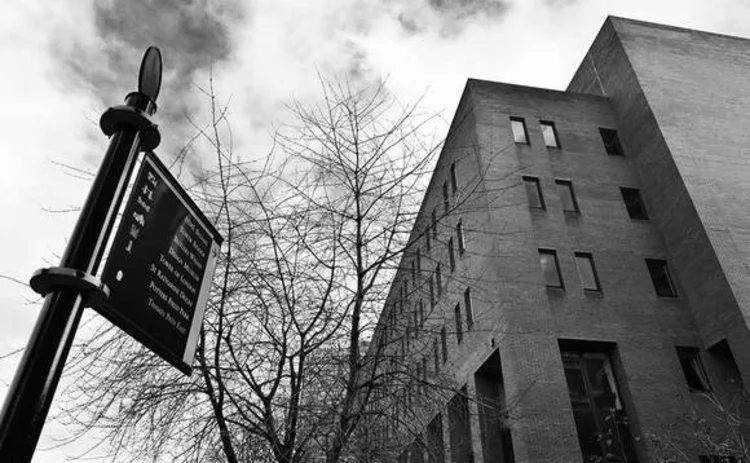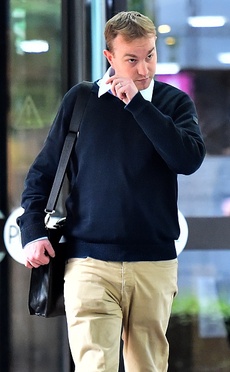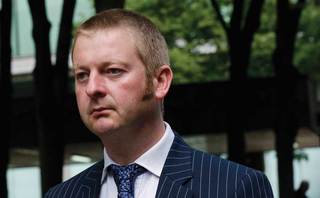
Libor trial: the first two weeks
Former UBS and Citi trader Tom Hayes faces eight charges of conspiracy to commit fraud in the first of the UK's Libor-rigging trials. Read a day-by-day summary of the proceedings so far

Day 1: Hayes cajoled brokers to help him – prosecution
Opening for the prosecution on the first day, May 26, of what is expected to be a 10–12 week trial, Mukal Chawla called Hayes the "ringmaster at the very centre, telling others around him what to do and in a number of cases rewarding them for their dishonest assistance". His activities were not confined to the bank at which Hayes worked. "He tried to rig, and in many cases succeeded in rigging, the rates at other banks," Chawla said.
 Following his arrest in December 2012, Hayes (pictured leaving court on May 26) spent five months being interviewed voluntarily by the UK's Serious Fraud Office (SFO). Hayes confirmed to the SFO that he made "about $150 million" for UBS throughout a three-year period. And for that, he was richly paid, said the prosecution. Hayes's 2009 salary at UBS (for a nine-month period) was £1.3 million, while Citi offered him £3.5 million in remuneration the following year.
Following his arrest in December 2012, Hayes (pictured leaving court on May 26) spent five months being interviewed voluntarily by the UK's Serious Fraud Office (SFO). Hayes confirmed to the SFO that he made "about $150 million" for UBS throughout a three-year period. And for that, he was richly paid, said the prosecution. Hayes's 2009 salary at UBS (for a nine-month period) was £1.3 million, while Citi offered him £3.5 million in remuneration the following year.
Day 2: Prosecution says language in emails 'speaks for itself'
The prosecution showed the court how the Libor movements on particular days could be traced back to Hayes's requests. The requests would sometimes prove successful while other times the nudges would simply put certain bank rates in to the "outlier" territory – meaning their submission would be in the top four or the bottom four of the 16 panel bank submissions, which at the time would be ruled out before the average was calculated.
The prosecution reminded the jury that a conspiracy involves people working together to commit a dishonest act, even when that act – such as collectively bumping the Libor submission up or down a couple of basis points – does not have the desired effect. And he Chawla added that the conversations included in the evidence show "it's not just Hayes who is manipulating – there are lots of people doing it", but that that didn't make it "any less wrong".
Day 3: Libor fixed with £336,000 in bribes – prosecution
Hayes asked for Libor submissions to be doctored in hundreds of messages to his brokers in exchange for hundreds of thousands of pounds in "bribes", the court heard on May 28.
After speaking to Hayes about what rate he wanted, his brokers would then contact individual bankers and ask them to change their Libor submissions, sometimes in return for the promise of future rate fixing in their favour. Chawla told the court Hayes's brokers were motivated by the money they would make from brokerage fees through 'wash trades' – simultaneous buying and selling with no overall position impact, carried out purely to gain extra commission for the broker – and outlined the details of 14 wash trades totalling more than £336,000.
Day 4: Hayes was fully aware his actions were dishonest
In the months following his arrest in December 2012, Hayes signed a co-operation agreement with the SFO to assist in its Libor investigation, Southwark Crown Court heard on June 1. Transcripts of the ensuing interviews show his admission that he "acted dishonestly" in manipulating – or attempting to manipulate – Libor submissions, according to the prosecution.
However, Hayes then changed his mind about the agreement – which is usually used to make suspects eligible for a reduction in any sentencing – and now pleads not guilty.
The court heard Hayes say on a voice recording: "There was one occasion where there was a very deliberate attempt by me and the guy at Deutsche [Bank] called Guillaume Adolph to align our positions and make the arrangement to keep Libor high and then low ... it is basically price-fixing, as the US likes to call it, anti-trust."
Day 5: Rate rigging was endemic – Libor trial
During the same SFO interview Hayes told investigators that attempted rate manipulation was common at institutions with trading interests that depended on the benchmark.
"It's entirely endemic ... it happens all over the place," he said, according to a transcript read in court on June 2. Hayes also claimed in the interview that he was seated next to the UBS Libor submitter specifically so that the two could communicate over how to set the rate, implying this arrangement was decided by more senior managers within the bank.
"I don't want to sound like a martyr, but that company, UBS, hung me out to dry," Hayes told the SFO, according to the transcript. "There's no way I'm the single Libor manipulator in the world. For them to say that I'm a rogue operator, when they sat me next to the bloke who set the bloody thing."
Day 6–7: Rumours of Libor rigging emerged in 2007, Hayes jury hears
The deputy chief executive of the British Bankers' Association (BBA), Sally Scutt, told the court that the industry group heard reports of Libor-rigging from September 2007 onwards, but decided not to act because of the rate's centrality to the financial markets. The BBA was responsible for administering the Libor-setting process until 2014.
"There were all these rumours" that banks were submitting inaccurate Libor rates to boost the perception of their borrowing ability – "I think confidence
is absolutely critical to the running of the markets," she told the jury. But, as the financial crisis worsened, "people weren't sure whether banks remained creditworthy".
The court heard a transcript of Hayes telling SFO investigators that he would "tweak [Libor] around the edges", but he distanced his actions from what he called the "solvency issue" between 2008–2009, which involved banks "effectively lying about their position" to give a false impression of financial strength, he said.
Day 8: BBA and BoE aware of banks submitting false rates – Libor trial
Senior members of the BBA were aware the rate was being abused as early as 2005, Southwark Crown Court heard on June 5.
 "There is consensus amongst banks that sterling Libor and US dollar are being set 3–4 basis points above the true cash rate," John Ewan (pictured leaving court on June 5), in charge of Libor at the BBA between 2006 and 2010, wrote in a report on Libor in 2005.
"There is consensus amongst banks that sterling Libor and US dollar are being set 3–4 basis points above the true cash rate," John Ewan (pictured leaving court on June 5), in charge of Libor at the BBA between 2006 and 2010, wrote in a report on Libor in 2005.
"This is a major problem and must be fixed," was the view of one Credit Suisse representative. The representative from HBOS was quoted as saying: "Some companies will quote rates to suit their current position. It has always been the way."
Ewan and Scutt both acknowledged that issues of banks altering Libor from the cash value were well understood within the organisation. "We would hear repeated allegations that were never actual smoking guns," Ewan told the court.
Day 9: BBA avoided knowing which banks were rigging Libor, jury hears
A transcript of a phone call in 2007 showed Ewan admitting to his colleague: "Somebody at Gulf International Bank rang me this morning and said, 'Libors are too low' and he says a contributor bank offered to take cash from him at ten basis points above what they had been contributing ... He didn't name the bank and I specifically asked him not to."
Ewan told the jury that he had not wanted his source to name the bank because he would not have known what to do with that information: "I didn't have clear guidelines," he said, adding that there could have been "difficulty" – bordering on a conflict of interest – if he found out that one of its members was manipulating Libor.
Day 10: Hayes trial hears BBA ditched plan to stop Libor 'low-balling'
In April 2008 Ewan sent an internal memo suggesting a potential policy where banks would be asked periodically to show proof that they had made relevant deals at – or very close to – the Libor they had quoted.
"If a contributor cannot provide evidence for this," the suggestions read, "we would recommend that they be removed from the panel. This would be highly embarrassing, and very damaging for a bank's reputation."
After the BBA's recommendations were circulated to committee members in April 2008, Ewan received a call from Miles Storey, then Barclays' head of group balance sheet, who warned that banks might take offence at the tougher rules and opt out of the Libor-setting process. "Ironically, you could get a request to be removed," Storey said. Ewan told the jury: "You probably shouldn't have major benchmarks run by trade bodies, and Libor no longer is."
Day 13: Libor trial hears of 'bribe' wash trades as Lehman failed
Hayes hit on the idea of using wash trades to reward the brokers who helped him in September 2008 – which meant his first attempts floundered in the aftermath of the Lehman Brothers collapse, the court heard on June 12. Hayes's broker, left with a sizeable ¥400 billion wash trade to put through, had difficulty finding a willing counterparty to take the other side of the trade.
Merrill Lynch's trader, contacted by Hayes's broker, had remarked that "it looks a bit dodgy actually" and refused to take part, pointing out that "these are tough times for bankers". Citing a "credit issue", JP Morgan's Stuart Wiles agreed to take part – but only for ¥50 billion. And Neil Danziger at RBS agreed to take ¥150 billion in return for the broker providing lunch for the entire desk, the transcripts showed. Further wash trades took place later in the year, the court heard.
The trial continues.
Only users who have a paid subscription or are part of a corporate subscription are able to print or copy content.
To access these options, along with all other subscription benefits, please contact info@risk.net or view our subscription options here: http://subscriptions.risk.net/subscribe
You are currently unable to print this content. Please contact info@risk.net to find out more.
You are currently unable to copy this content. Please contact info@risk.net to find out more.
Copyright Infopro Digital Limited. All rights reserved.
As outlined in our terms and conditions, https://www.infopro-digital.com/terms-and-conditions/subscriptions/ (point 2.4), printing is limited to a single copy.
If you would like to purchase additional rights please email info@risk.net
Copyright Infopro Digital Limited. All rights reserved.
You may share this content using our article tools. As outlined in our terms and conditions, https://www.infopro-digital.com/terms-and-conditions/subscriptions/ (clause 2.4), an Authorised User may only make one copy of the materials for their own personal use. You must also comply with the restrictions in clause 2.5.
If you would like to purchase additional rights please email info@risk.net
More on Operational risk
Evalueserve tames GenAI to boost client’s cyber underwriting
Firm’s insurance client adopts machine learning to interrogate risk posed by hackers
Integrated GRC solutions 2024: market update and vendor landscape
In the face of persistent digitisation challenges and the attendant transformation in business practices, many firms have been struggling to maintain governance and business continuity
Vendor spotlight: Dixtior AML transaction monitoring solutions
This Chartis Research report considers how, by working together, financial institutions, vendors and regulators can create more effective AML systems
Financial crime and compliance50 2024
The detailed analysis for the Financial crime and compliance50 considers firms’ technological advances and strategic direction to provide a complete view of how market leaders are driving transformation in this sector
Automating regulatory compliance and reporting
Flaws in the regulation of the banking sector have been addressed initially by Basel III, implemented last year. Financial institutions can comply with capital and liquidity requirements in a natively integrated yet modular environment by utilising…
Investment banks: the future of risk control
This Risk.net survey report explores the current state of risk controls in investment banks, the challenges of effective engagement across the three lines of defence, and the opportunity to develop a more dynamic approach to first-line risk control
Op risk outlook 2022: the legal perspective
Christoph Kurth, partner of the global financial institutions leadership team at Baker McKenzie, discusses the key themes emerging from Risk.net’s Top 10 op risks 2022 survey and how financial firms can better manage and mitigate the impact of…
Emerging trends in op risk
Karen Man, partner and member of the global financial institutions leadership team at Baker McKenzie, discusses emerging op risks in the wake of the Covid‑19 pandemic, a rise in cyber attacks, concerns around conduct and culture, and the complexities of…







